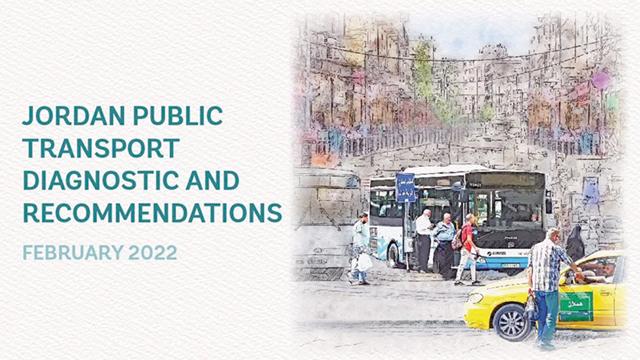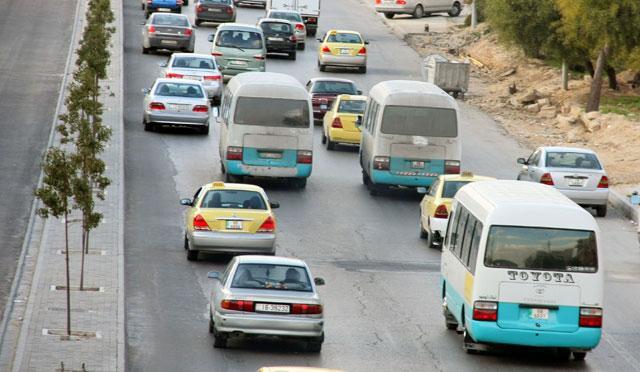You are here
Transport-related inefficiencies cost Jordan about $3 billion a year — World Bank report
By Batool Ghaith - Jun 07,2022 - Last updated at Jun 07,2022

The cover of the report
AMMAN — Women make up just a third of passengers using public transport in Jordan and less than 50 per cent of women use public transport, according to the World Bank’s Jordan Public Transport Diagnostic and Recommendations report, released on Tuesday.
The report identifies the challenges and obstacles to an accessible, safe, affordable and gender sensitive public transport system.
It indicates that poor public transport makes it harder for women and youth without cars to work. “Women’s low participation in the country’s labour market means Jordan’s economy can lose about USD 65 million a year in productivity by 2030,” the report states.
The report notes that for inclusive growth and employment, Jordan’s residents, including women and youth, need “efficient, reliable, safe and cost-effective” public transport.
According to the report, the estimated cost for Jordan for transport-related inefficiencies was about $3 billion a year, or at least 6 per cent of GDP, without counting its impact on women’s participation in the labour force.
Demand for mobility investments has been increasing over the past 15 years in Jordan, which has a growing population concentrated in Amman. However, the high demand for public transport has not been adequately met with an improved quality of public transport, resulting in low ridership and a shift to the use of private vehicles, the report shows.
According to the report, Greenhouse Gas (GHG) emissions from Jordan’s transport sector are estimated to have increased to over 11,000 Gg of CO2 a year, costing the economy $500 million to $1,000 million per year.
The public transport system in Jordan’s cities is “uncoordinated, inefficient and has poor coverage”, according to the report.
Public transport vehicles operating in the country amount to approximately 1,400 buses, close to 4,000 minibuses, and over 4,000 service (shared) taxis, in addition to over 16,000 conventional taxis; about 85 per cent of buses and taxis are individually owned and operated, according to the report.
The public transport services are “unreliable, with no timetables, little information for users, and low frequencies”, the report notes.
Infrastructure is “limited and of low quality” and vehicles are not maintained regularly.
The vehicle fleet is ageing, with a public transport fleet’s average operational life of 10.6 years, and inspections regarding worthiness, safety, and emissions are limited to licensing renewal, the report says.
Inaccessible services
As about 13 per cent of the country’s population has a disability and 84 per cent of them live in urban areas, where, together with the other mobility-impaired people such as the elderly, pregnant women, or parents carrying children, they face numerous mobility challenges.
“Public transport is not accessible to such groups physically nor in economic terms, as trips are often more expensive for people with disabilities, which leads to reduced opportunities,” the report says.
The report indicates that about 33.6 per cent of women are dissatisfied with the current public transport system and 18.1 per cent of women are extremely dissatisfied.
In addition, security is also a concern as vehicles are often overcrowded, unclean and unsafe and 62.6 per cent of women have been subject to some form of harassment while accessing public transport.
A recent study found that 47 per cent of women in Jordan have turned down jobs due to the lack of viable public transport options, the report says.
“It is estimated that enhancing the public transport system in Jordan would yield significant environmental benefits. Jordan has not yet been able to decouple economic growth from carbon emissions. Transport, together with energy, is the main contributor to GHG emissions,” the report says.
Investments in transport
To meet the sector’s growing mobility needs, Jordan has prioritised investing in transport infrastructure with limited attention to pedestrians, cyclists and public transport, according to the report.
The Government of Jordan is taking steps towards enhancing public transport and is engaged in several projects and initiatives to meet this objective; however, additional efforts are still needed, the report says.
The report proposes six priority recommendations: Consolidating bus operators, integrating tariffs and operations, implementing Intelligent Transport Systems (ITS), developing a traffic demand management programme that includes managing parking, restricting cars and introducing congestion charges.
The report also recommends developing a Road Safety National Plan and pedestrian and cycling masterplans, as well as coupling investments in public transport projects with urban renewal and development, as reforming public transport is “essential for green growth and inclusion”.
Saroj Kumar Jha, World Bank Mashreq Regional Director, noted that improving the public transport system in Jordan “could bring about large gains in human capital, especially for Jordanian women, and gains for the environment and economy”.
“Jordan is in a position to create an accessible, reliable, affordable, gender sensitive and green public transport system that provides everyone access to services and job opportunities and contributes to decarbonisation,” Jha said during his remarks at the launching event on Tuesday.
He added that Jordan needs to build a green and sustainable public transport system.
Daily necessity
Transport is a vital sector for the Kingdom’s economy and an important component of Jordanians’ daily life, according to Minister of Transport Wajih Azaizeh.
“Enhancing Public transport is a key priority as part of our updated long-term strategy, aimed at satisfying the transport demand within a framework of social, economic, financial and environmental sustainability to support the economic development of the country fully,” the minister added.
The report indicates that the Government of Jordan has launched various initiatives to improve the transport sector. In 2017, a new law laid out a framework for reforms and pilot projects and other efforts are underway.
Jordan also introduced a Code of Conduct in 2019 — the first-ever of its nature in the sector — aimed at setting standards for the behaviour of passengers, drivers, and operators and designed for all users, but particularly for women and girls.
“Reforming public transport is essential for green growth and inclusion. Investments in public transport, such as the BRT, can enhance the sector and should be coupled with reforms to ensure their success and expand the benefits to everyone,” the report says.
The report was launched during a regional workshop on Improved Gender-Responsive Public Transport for All in Mashreq in Amman that brought together representatives from the public sector, private sector, academia and civil society organisations from Iraq, Lebanon and Jordan.
Related Articles
Transport Minister Lina Shbeeb and International Road Transport Union (IRU) General Delegate to the Middle East Haydar Ozkan on Monday discussed the possibility of transport-related cooperation.
AMMAN — Minister of Transport Wajeeh Azaizeh on Sunday met with World Bank's Regional Director of the Mashreq Department Saroj Jha to
AMMAN — The decline in the number of means of transport in Jordan adds further challenges to working women, according to Jordanian women.Rec

Opinion
Apr 09, 2025
Apr 08, 2025
- Popular
- Rated
- Commented
Apr 09, 2025
Newsletter
Get top stories and blog posts emailed to you each day.















